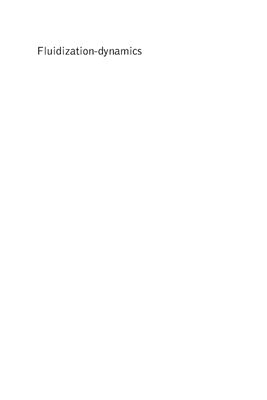Butterworth-Heinemann. 2001. 232p
Fluidization Dynamics has been written for students and engineers who find themselves involved with problems conceing the fluidized state. It presents an analysis that focuses directly on the problem of predicting the fluid dynamic behaviour of a proposed fluidized system for which empirical data is limited or unavailable.
The second objective is to provide a treatment of fluidization dynamics that is readily accessible to the non-specialist. The linear approach adopted in this book, starting with the formulation of predictive expressions for the basic forces that act on a fluidized particle, offers a clear way into the theory. The incorporation of the force terms into the conservation equations for mass and momentum and subsequent applications are presented in a manner that requires only the haziest recollection of elementary fluid-dynamics theory.
The analyses presented in this book represent a body of research that has appeared in numerous publications over the last 20 years. L.G. Gibilaro has taken the opportunity to reorder much of the material in the light of subsequent knowledge, to correct minor errors and inconsistencies and to add detail and clarification where necessary. This material helps to form the basis for university course modules in engineering and applied science at undergraduate and graduate level, as well as focused, post-experienced courses for the process, and allied industries.
· Bridges the gulf between observed behaviour and fluid-dynamic theory
· Clear account of basic theory of fluidization
· Accessible treatment of fluidization analysis
Fluidization Dynamics has been written for students and engineers who find themselves involved with problems conceing the fluidized state. It presents an analysis that focuses directly on the problem of predicting the fluid dynamic behaviour of a proposed fluidized system for which empirical data is limited or unavailable.
The second objective is to provide a treatment of fluidization dynamics that is readily accessible to the non-specialist. The linear approach adopted in this book, starting with the formulation of predictive expressions for the basic forces that act on a fluidized particle, offers a clear way into the theory. The incorporation of the force terms into the conservation equations for mass and momentum and subsequent applications are presented in a manner that requires only the haziest recollection of elementary fluid-dynamics theory.
The analyses presented in this book represent a body of research that has appeared in numerous publications over the last 20 years. L.G. Gibilaro has taken the opportunity to reorder much of the material in the light of subsequent knowledge, to correct minor errors and inconsistencies and to add detail and clarification where necessary. This material helps to form the basis for university course modules in engineering and applied science at undergraduate and graduate level, as well as focused, post-experienced courses for the process, and allied industries.
· Bridges the gulf between observed behaviour and fluid-dynamic theory
· Clear account of basic theory of fluidization
· Accessible treatment of fluidization analysis

